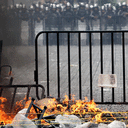
The progressive Democrat is going to win today’s race for mayor of New York City, but what his victory will mean remains to be seen. As those who seek progressive changes in government and society should know, their work begins, …

Since the Clinton administration, we have seen growing concern about income inequality, the clear failure of TANF to work as a safety net program, and that effectively ending welfare has not stopped Republicans from mounting new attacks on the poor. All of this indicates the urgency of reopening the welfare debate and initiating a public discussion that challenges archaic conservative ideas about poverty.

This week on Belabored, Sarah Jaffe and Michelle Chen look at New York after Superstorm Sandy. Who did the work of the recovery and how has it affected them, who’s out of a job, what did Sandy teach us about what a union can do? Featuring NYSNA president Judy Sheridan-Gonzalez, with her thoughts on how Sandy made people look at their union–and the world–differently. They also look at some scary stuff for Halloween: a candy factory explosion, inside an anti-union captive audience meeting, and more.

A Small World is a self-consciously exclusive social network aimed at a certain class of internationals—referred to interchangeably as “global nomads,” “citizens of the world,” or, more frequently, the “global elite.” The site reveals that modern cosmopolitanism has been a largely market-driven phenomenon, designed for capital, not citizens, to become “of the world.”

Early twentieth-century skeptics were rightly suspicious of plutocrats deciding how to improve the human condition and then paying to translate their notions into public policy. Now it’s time for a new progressive era—complete with muckrakers and trust-busters to cast a critical eye on big philanthropy.

This week on Belabored, Sarah and guest co-host Peter Frase discuss international solidarity campaigns with American workers and give an update on the situation in Detroit. Then, independent journalist Susie Cagle joins them to talk about labor unrest in the Bay Area, where solidarity can be hard to come by.

Technological innovation has been key to American military policy since 9/11, but it has by no means been the only driver of change. We might better view these years as a story of the U.S. national security apparatus gradually breaking free of the restraints imposed on it in the wake of Vietnam and Watergate. It is also a story of the military and intelligence wings of this apparatus becoming increasingly intertwined and indistinguishable from one another.

As revolt continues to shake the globe, as images of mass protest and riot become the norm on the evening news, they become a part of the global consciousness and, as such, produce a new series of images for Hollywood to attempt to capture. But in putting a flaming White House in every subway station in America, not to mention in dozens of nations abroad, what desires could Hollywood unleash?

This week, Sarah Jaffe and guest host Michelle Chen discuss retail organizing, the fallout of government shutdown, standardized test insanity, and solidarity in higher education.

As new scholarship has challenged the standard view of postwar American history, the need for a new narrative has become obvious. Joshua Freeman’s recent survey of the nation since 1945 is comprehensive in scope, but fails to develop a new way of understanding the recent past.

The Affordable Care Act is better than nothing and it has already had a real impact. But it is a timid law that will likely show timid results in the long run. Real health care reform will require lawmakers to confront the problems that the ACA studiously avoided.

Until 1989, before the start of the armed rebellion against Indian rule, foreign and Indian visitors flocked to the valley. In 1987, according to a government survey, Kashmir welcomed 700,000 tourists. Three years later, as violence gripped Kashmir, the number fell to just 6,000. Those who survived on tourism ate their savings and scraped together different work.

In September Poland went on strike. In many countries struck by economic hardships and severe austerity measures, a mass strike would be no news at all. But in a country where media relentlessly reiterate the dogma that the general public is “passive” and there are no unions “worth reasoning with,” this is news indeed. It also raises questions about the relationship between today’s protests and the original Solidarity movement.

The debate over the working conditions for adjunct faculty was recently reignited by the death of Margaret Mary Vojtko, a longtime adjunct professor at Duquesne University who was fired in the last year of her life and died penniless. Moshe Marvit talks to Dan Kovalik, a labor lawyer who knew Votjko and has helped to publicize her story.

Mexican leftists have flocked to support teachers’ unions in their protests against proposed education reforms. But by overlooking the unions’ undemocratic features and lack of popular support, the left weakens the fight against neoliberalism.





















